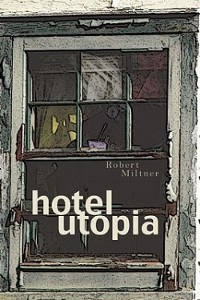
Hotel Utopia
by Robert Miltner
Poetry
New Rivers Press Many Voices Project, 2011
$ 13.95, 70 pages
ISBN: 978-0898232554
In "Dear Beautiful Revolution," the last poem in Robert Miltner's edgy collection Hotel Utopia, the citizen-speaker declares to the government, "In our country, we're the capital." That declaration—at once ironic and sincere, a pronouncement of defiance and of unity, seasoned with a delicious pun—might well be considered the thesis of this lively book. Nevertheless, boiling such a dynamic collection down to an argument risks oversimplification of Miltner's ambitious project. But Miltner has a vision, and it is anything but random.
A gathering of prose poems, appropriate to its proletarian impulses, Hotel Utopia won New Rivers Press's Many Voices Project Prize. These poems slip in and out of the personal, the political, the magical, and the surreal. However, as the title of the book's last poem suggests, all the poems percolate with an urge towards revolution. Memory, ekphrasis, fantasy, candid observation—whatever the motivation for any individual poem, an underlying need to expose the cruel inequities of a culture dominated by corporate greed, conspicuous consumption, and political corruption drives this collection. There is rage in these pieces, a righteous rage, but a rage expressed through humor, compassion, even at times delight, especially in the arts. If Miltner's poems ask us what can save our noisy and disproportionate culture, they also imply the answer: our creative energy.
Take as a case in point "The Arts." In this poem, dedicated to the late jazz performance poet Gil Scott-Heron, the speaker repeats, "The arts will not be on the test." Instead, he states, the test will focus on math, because it "helps calibrate how to pepper specks of depleted uranium across whatever land is being bombed." Also, science is deemed useful because, for instance, "Astronomy helps the poor search the sky instead of their empty plates." The poem demonstrates that those subjects grounded in quantifying resources are typically valued in a culture obsessed with material production, and can also be easily manipulated by those in power to further entrench their power. By contrast, the arts are not measurable and therefore not valuable in such a culture:
A poem has no square root; a song has no chemical compound; a guitar solo will not fit
on a bell curve; a dance cannot be reduced to a lowest common denominator; an actor
resists dissection, fights being pinned down on cotton; a story has no mean, no mode, no
medium.
If artists cannot keep leaders and figureheads honest, they can at least expose dishonesty and disguised self-interest....
It is thus no accident that many of the poems in this collection are dedicated to or inspired by artists of various stripes. The poem in which the book's title appears, "Box of Light," is simultaneously an homage to box collage artist Joseph Cornell and a celebration of leftist political ideals: "After the revolution, stop by," the speaker declares. "We're all stars at the Hotel Utopia." An Honoré Daumier painting inspires "The Uprising," which describes a crowd enraged to foment revolution until their own fire for change exhausts them. "Birth of the Cool," headnoted "after a Jackson Pollock action painting," describes in list-poem fashion the bittersweet explosion of modern innovation that took place in American culture in the 1950s (one delightful description: "Highways scarred the American landscape like a holiday ham, decorated the cloverleaf interchanges like pineapple slices"). "Crossfire," inspired by a Pablo Picasso painting, imagines the Virgin Mary telling a resurrected Jesus and Mary Magdalene that they cannot claim her baby for the world's uses as her child is a "private issue" (another skillfully deployed pun). The arts and humanities are inextricably entwined with politics here. If artists cannot keep leaders and figureheads honest, they can at least expose dishonesty and disguised self-interest.
Not all of the poems are overtly political, although the struggle of the common person underlies each piece. "Black House" examines human fears of death, contemplating the adage that we cannot dream about the instant of our deaths. "Hope" describes the speaker's role as companion to his father-in-law on a fateful doctor visit and their subsequent stunned interactions (as such, the poem is evocative of the late poetry of Raymond Carver, one of Miltner's scholarly interests). Hauntingly beautiful, "Accident" describes in appropriate passive voice the stark imagery that colors the instant when a truck collides with a pedestrian couple. "Jack, Neal, and a '49 Hudson" is a meditation on a culture on the verge of radical artistic change. In addition to Kerouac, the poem brings together Salinger, Ginsberg, Chairman Mao, and the speaker's young and busy parents, dependent for their livelihood on an ominously growing corporate America as the young couple anticipated the speaker's (presumably the author's) birth.
Some readers of Hotel Utopia may struggle with its eclectic subject matter and sometimes frenetic pace. But such a structure seems natural given the often frustrating, highly complex, whirligig nature of the postmodern world the book reflects. And given the charged emotion that churns beneath the surface of even its calmest poems, we should expect at least a little chaos here. But the book is certainly not only a chronicle of postmodern unease. Readers—whether artists or audience or both themselves—should take some comfort in that loaded final message: "In our country, we're the capital."

